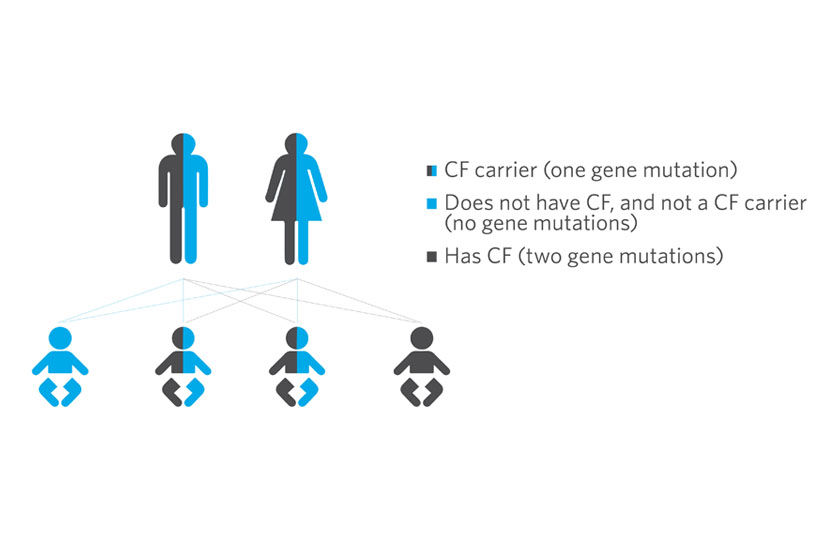- By Christy Moore
- Christy's Corner, Genetics
- Posted November 04, 2015
What is cystic fibrosis?
What is cystic fibrosis?
Cystic fibrosis (called “CF” for short) is a genetic condition. That means a person is born with it – it cannot be “caught,” like a cold or flu. There is a very broad range of how serious the health problems can be: some people have a severe form with lung and digestion problems, and some people have a very mild form, with few health problems.
People with CF can have very thick, sticky mucus in the lungs, which is difficult to cough out. This can cause wheezing and shortness of breath, and also creates an environment for bacteria to grow, causing serious infections. People with CF can also have problems with their pancreas, which helps us digest our food. When the pancreas isn’t working properly, it is hard for our body to digest food, and this makes it hard for us to maintain and gain weight. For someone with CF, troubles with gaining weight can begin as a young baby.
What causes CF?
CF is caused by a mutation (or typo) in a particular gene (please see What is DNA?) . The gene is called cystic fibrosis transmembrane conductance regulator (or CFTR). It gives our body instructions on how to make a protein that helps move salt in and out of the body tissues, something our body needs to do. If CFTR has a mutation in it, the protein doesn’t get built as it is supposed to, and may not work as well. When salt cannot move easily between our body’s tissues – such as in the lungs – it can cause thick, sticky mucus to clog the lungs. It also causes a high level of salt in the sweat, and for the digestive system to not work as well.
How is CF diagnosed?
There are many ways a person may be diagnosed with CF.
- Newborn Screening: In most places, after babies are born, a nurse will take a “heel stick” by pricking a baby’s heel and squeezing a drop of blood onto a special kind of paper. This “blood spot” goes to a special lab where it is tested, to check for the possibility of many genetic conditions. While this test cannot tell you for sure whether or not a baby has a certain condition, it can point out which babies should have more detailed testing done. CF is included on many newborn screening tests. If a baby “screens positive” for CF, more testing must be done to find out if the baby really has CF.
- Sweat test: Because people with CF have a higher level of salt in their sweat, the “sweat test,” (also called the “sweat chloride test,”) is a good way to check a person for CF. It measures the amount of salt in someone’s sweat. The test is not painful, and is done by putting a chemical on the skin, as well as a small electric pad, in order to make the skin produce sweat. The sweat is collected on special paper and tested. A high salt level means the person may have CF. Sometimes this test must be repeated to be sure.
- Genetic testing: If a doctor thinks a person might have CF, he or she can order a genetic test. This looks at the person’s DNA (more specifically, their CFTR gene) to see if there are any mutations (like typos) in the gene. There are a few types of genetic tests for CF, so a doctor or genetic counselor can explain the test he or she ordered.
How is CF inherited?
CF is inherited in an autosomal recessive pattern (please see What is DNA?). That means that a person with CF has a mutation (or typo) in both of their CFTR genes. If a person has a mutation in only one gene, they usually do not have symptoms, and are called a “carrier.” However, if they have children with someone who is also a carrier for CF, there is a chance their child could have it. No one has any control over which genes they pass to their children, though, it just happens automatically when we have children.

People who carry a mutation in only one copy of their CF gene are called “carriers,” and do not usually have symptoms. If their partner is also a CF carrier, there is a 1 in 4 (25%) chance for them to have a son or daughter with CF in every pregnancy together. There is a 2 in 4 (50%) chance for them to have a child who is a CF carrier (usually without symptoms), and a 1 in 4 (25%) chance for them to have a child who does not have CF, and is not a CF carrier.
Anyone can be a CF carrier, but is it most common in Caucasian people of Northern European background, where about 1 in 25 people is a CF carrier.
How is CF treated?
Right now there is no cure for CF. However, there are many treatments to help people with CF. Oral medicines and inhaled medicines help to open the airways, and something called percussion therapy can help loosen the mucus in the lungs. Antibiotics can be taken to reduce the chance of bacterial infections. There are also medicines that help the body break down food if the pancreas isn’t working well, to make sure people get proper nutrition. There are also new medicines that can help the CFTR protein work better in the body, depending on the type of mutation in the gene. A doctor will look at each person’s health and prescribe the best treatment options for them. For some people with CF who are healthy enough, surfing can be a fun way to get natural therapy for CF (see “What is saline?”)
Where can I learn more?
- Cystic Fibrosis Foundation: cff.org
- National Society of Genetic Counselors: nsgc.org
- Canadian Association of Genetic Counsellors: cagc-agcc.ca
- Ambry Genetics: ambrygen.com
Comments
Education
-
Lisa Andersen, four-time world surfing champion, kicks off Mauli Ola’s eight month campaign for Breast Cancer!
Mar 30, 2016 / Genetics, Surfing -
Saline Treatments and Surfing's Positive Impact
Feb 26, 2016 / Christy's Corner, Cystic Fibrosis, Genetics, Surfing -
What is DNA?
Nov 18, 2015 / Christy's Corner, Genetics -
What is saline?
Nov 11, 2015 / Christy's Corner, Cystic Fibrosis, Surfing -
What is cystic fibrosis?
Nov 04, 2015 / Christy's Corner, Genetics




















































Caleb Remington
November 25, 2015 17:29
This is rad! Way cool : )